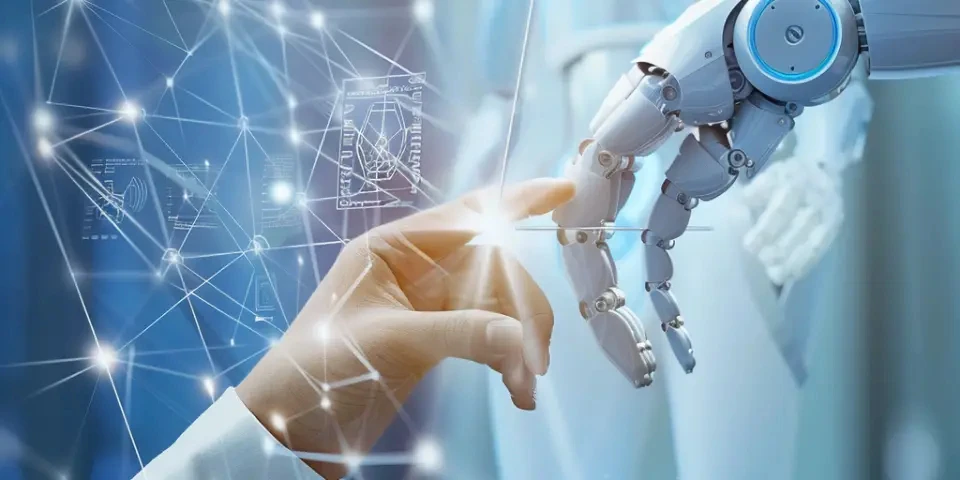Unleashing the Power of AI How It Can Enhance Your Everyday Life
Artificial Intelligence (AI) has rapidly become an integral part of our daily lives. From virtual assistants to self-driving cars, AI-powered technologies continue to revolutionize the way we live and work. In this article, we explore the various ways in which AI can enhance our everyday lives.
1. Personalized Recommendations
AI algorithms analyze vast amounts of data to provide personalized recommendations tailored to our interests and preferences. Whether it's suggesting movies on streaming platforms or recommending products on e-commerce websites, AI enables us to discover new and relevant content with ease.

2. Efficient Healthcare
AI-powered diagnostics systems are transforming the healthcare industry. Machine learning algorithms can identify patterns in medical data and help diagnose diseases more accurately and efficiently. Additionally, virtual nurses and chatbots are being used to provide round-the-clock healthcare assistance and support.
3. Enhanced Transportation
Self-driving cars are one of the most exciting applications of AI in transportation. These vehicles use AI algorithms to understand their surroundings and make autonomous decisions, leading to safer and more efficient travel. AI-powered traffic management systems can also optimize traffic flow, reducing congestion and travel time.
4. Improved Cybersecurity
With the growing threat of cyber attacks, AI plays a crucial role in enhancing cybersecurity. Machine learning algorithms can detect and respond to potential threats in real-time, protecting both individuals and organizations from data breaches and malware attacks.
5. Personal Productivity Boost
Virtual assistants like Siri and Alexa have become indispensable tools for increasing personal productivity. Whether it's setting reminders, managing calendars, or completing tasks, AI-powered virtual assistants simplify our daily routines and help us stay organized.
6. Advanced Customer Service
AI chatbots are revolutionizing customer service by providing instant assistance and resolving queries efficiently. These chatbots use natural language processing algorithms to understand and respond to customer inquiries, streamlining the customer support process and improving overall satisfaction.
7. Smart Home Automation
AI technology enables smart home devices to learn and adapt to our behavior, making our homes more efficient and convenient. From adjusting the temperature and lighting to managing appliances, AI-powered home automation systems enhance comfort and energy efficiency.
8. Financial Innovations
AI is transforming the financial industry by revolutionizing tasks such as fraud detection, risk assessment, and investment management. Machine learning algorithms can analyze vast amounts of financial data to detect anomalies and patterns, leading to more secure transactions and effective financial planning.
9. Educational Assistance
AI-powered educational platforms provide personalized learning experiences tailored to individual students' needs. These platforms use adaptive learning algorithms to identify strengths and weaknesses, offering personalized recommendations and feedback, ultimately enhancing the learning process.
10. Natural Language Processing
Advancements in natural language processing have made voice assistants incredibly powerful. From language translation to voice recognition, AI-powered assistants can understand and respond to human speech, making communication and language-related tasks more convenient and accessible.
11. Environmental Conservation
AI algorithms are increasingly being used to address environmental challenges. From optimizing energy consumption to predicting climate patterns, AI-powered solutions contribute to sustainable practices and assist in environmental conservation efforts.
12. Precision Agriculture
AI technologies such as drones and sensors are revolutionizing the agriculture industry. These tools collect data on crop health, soil conditions, and weather patterns, allowing farmers to make data-driven decisions and optimize crop yield while reducing resource consumption.
13. Creative Assistance
AI-powered tools can assist creative professionals in various domains. For example, AI algorithms can generate music, aid in video editing and production, and even create realistic artworks. These tools augment human creativity and push the boundaries of artistic expression.
14. Autonomous Robotics
AI is driving advancements in robotics, enabling the development of autonomous machines for tasks ranging from manufacturing to healthcare. These robots can perform repetitive and dangerous tasks with precision, freeing up human workers to focus on more complex and creative endeavors.
15. Ethical Considerations
As AI continues to advance, it is important to address ethical considerations associated with its use. Discussions around privacy, bias in algorithms, and AI's impact on employment and society are crucial to ensure responsible and inclusive AI development and deployment.
Frequently Asked Questions
Q: Is AI going to replace human jobs? A: While AI may automate certain tasks, it also creates new opportunities and complements human skills in many fields. It is more likely to transform job roles rather than completely replace them. Q: Can AI be biased? A: Yes, AI algorithms can be biased if they are trained on biased data. It is important to ensure diversity and fairness in the data used to train AI models to mitigate bias. Q: How secure is AI technology? A: AI technology itself can be secure, but vulnerabilities can still arise. It is crucial to implement robust security measures and regularly update AI systems to protect against potential threats. Q: Can AI understand emotions? A: While AI can analyze data related to emotions, it doesn't possess emotions itself. AI algorithms can detect patterns and facial expressions associated with emotions, but true emotional understanding is a complex human trait. Q: How can individuals contribute to the development of AI? A: Individuals can contribute to AI development by staying informed, providing feedback on AI systems, and participating in ethical discussions surrounding AI's impact.
References:
1. S. Russell, P. Norvig, Artificial Intelligence: A Modern Approach, Pearson, 2016. 2. J. Domingos, The Master Algorithm: How the Quest for the Ultimate Learning Machine Will Remake Our World, Basic Books, 2018.
Explore your companion in WeMate